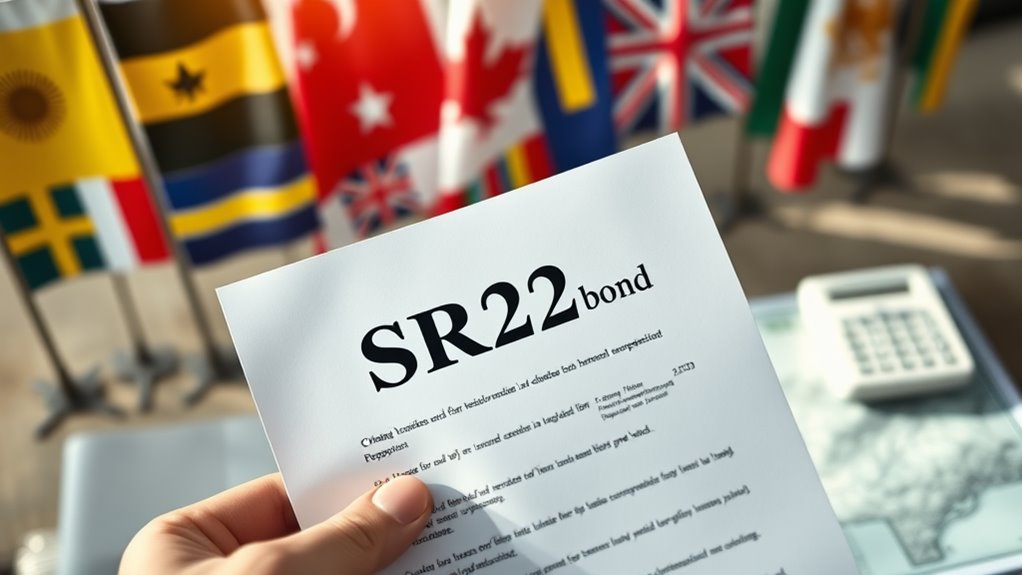10 Best Tips for SR22 Bond Filing Costs
When you find yourself needing an SR-22, like after a DUI or serious traffic violation, the costs can add up quickly. Understanding the intricacies of SR-22 bond filing is essential to managing those expenses effectively. By exploring various strategies, you can potentially save a significant amount. Discovering how to navigate insurance options, discounts, and state requirements could make all the difference in your financial planning.
Key Takeaways
- Compare multiple insurance quotes to find the best SR-22 rates, as costs can vary significantly among providers.
- Ensure all documentation is accurate and submitted on time to avoid delays and additional fees.
- Look for discounts, such as good driver or multi-policy discounts, to reduce overall SR-22 costs.
- Consider making upfront payments rather than monthly installments to save on total expenses.
- Stay informed about state-specific SR-22 requirements to prevent noncompliance and potential financial liabilities.
Understand SR-22 Filing Fees

When you're managing the SR-22 filing process, it's important to understand the associated fees that can influence your overall costs. The filing fee typically ranges from $25 to $100, depending on the state. This is a one-time expense paid directly to the state for processing the SR-22 document. Additionally, understanding the affordable SR22 insurance options available can help you save on your overall insurance costs.
While some insurance companies might offer monthly payment options for the filing fee, it's less common. Certain providers, like The General, include this fee in their insurance quotes, which can simplify budgeting.
It's crucial to note that fees can vary greatly by region, so checking local regulations is essential. Overall, understanding these fees helps you anticipate the financial implications of maintaining SR-22 insurance. Additionally, the SR-22 requirement can lead to increased insurance premiums that you should factor into your budget.
Compare Insurance Quotes for Best Rates
Comparing insurance quotes is essential for finding the best rates on SR-22 insurance, especially since costs can vary greatly among providers.
To secure the best SR-22 insurance rates, comparing quotes from various providers is crucial.
For instance, Erie Insurance offers the most affordable full-coverage SR-22 for drivers with minor offenses at $1,658 annually, while Progressive provides the cheapest liability SR-22 at $1,286 per year after major violations.
State Farm's competitive full-coverage rate averages $158 monthly. If you're a military member or family, USAA offers low-cost options.
Country Financial is particularly known for budget-friendly rates, especially for DUI offenses.
Choose Specialized SR-22 Insurance Providers
Choosing the right specialized SR-22 insurance provider is essential for traversing the complexities of high-risk coverage. By selecting a provider that understands your needs, you can guarantee compliance and affordability.
Here are three reasons to take into account specialized providers:
- Expertise in State Regulations: They understand local SR-22 requirements, guaranteeing you stay compliant without added stress.
- Tailored Support: Providers like Breathe Easy Insurance offer personalized assistance, guiding you through the filing process smoothly.
- Competitive Rates: Companies such as Esurance leverage technology to provide affordable options, keeping your premiums manageable.
Opting for a specialized SR-22 provider can make a significant difference in both your coverage experience and financial stability.
Make an informed choice to protect your interests.
Look for Discounts and Bundling Options

Finding discounts and bundling options can greatly reduce your SR-22 insurance costs, especially since many insurers offer various savings opportunities.
Start by exploring good driver discounts, which reward you for maintaining a clean driving record over time. Consider completing a defensive driving course, as this can also lead to substantial savings.
Explore good driver discounts and consider a defensive driving course to enjoy significant savings on your SR-22 insurance.
Bundling your SR-22 policy with other insurance types, like homeowners or renters insurance, often reveals multi-policy discounts. If you drive less, look into low mileage discounts, which are available in some regions.
Finally, opting for upfront payments instead of monthly installments can further decrease your overall costs. By actively seeking these options, you can greatly lower your SR-22 insurance expenses.
Consider Insuring a Used Vehicle
When you consider insuring a used vehicle for your SR-22 requirements, you're likely to benefit from lower insurance premiums and reduced overall costs.
Here are three key factors to keep in mind:
- Lower Purchase Cost: Used vehicles generally cost less to buy, easing your financial burden.
- Reduced Depreciation Impact: Since used cars lose value more slowly, your investment remains stable longer.
- Lower Insurance Premiums: Insurance for used vehicles typically costs less, making your monthly payments more manageable.
Ensure Quick Filing and Support Services
To guarantee a smooth SR-22 filing process, it's essential to leverage the resources offered by your insurance company and other support services. Many insurers provide automated electronic filing options, which can greatly expedite the process.
Companies like Progressive not only handle filings quickly but also offer customer support to guide you through any questions or concerns. Utilizing online platforms and apps can streamline your application, making it easier to track the status of your SR-22.
Additionally, consulting state insurance departments or brokers can yield valuable insights into your specific requirements. By tapping into these resources, you can make sure that your filing is efficient and compliant, minimizing delays and potential complications.
Know Your State-Specific Requirements

Understanding state-specific requirements for SR22 filings is essential for maintaining compliance and avoiding penalties. Each state has its own regulations that dictate the duration and cost of SR22 filings.
Familiarize yourself with the following key aspects:
- Duration: Most states require SR22 filings for one to three years, but some, like Florida, extend this to three years post-DUI.
- Coverage Levels: States like Georgia mandate specific minimum coverage amounts, impacting your insurance premiums.
- Consequences of Noncompliance: Failing to meet your state's requirements can lead to license suspension and increased financial liabilities.
Maintain Continuous Coverage to Avoid Lapses
Maintaining continuous coverage is essential not only for compliance with state regulations but also for protecting your financial stability. A lapse in your SR-22 coverage can lead to severe consequences, such as license suspension and additional fines.
To avoid these pitfalls, set up reminders for premium payments and monitor your policy's expiration dates. Consider using autopay to guarantee timely payments, and communicate proactively with your insurers during any policy changes.
Continuous coverage demonstrates financial responsibility, helping you maintain eligibility for standard insurance rates and avoid increased premiums. By managing policy shifts carefully and verifying that all documentation is in order, you can guarantee uninterrupted SR-22 coverage and safeguard your driving privileges.
Be Aware of Duration of SR-22 Requirements
- Offense Type: DUI or multiple violations often lead to longer durations.
- State Regulations: Each state has unique laws that dictate the SR-22 timeframe.
- Continuous Coverage: Failing to maintain insurance can lead to additional penalties.
Prepare for Potential Reinstatement Fees
When facing the reinstatement of your driving privileges, it's important to anticipate the financial obligations that may arise.
Reinstatement fees typically range from $100 to $300, varying by state and often influenced by the reason for your suspension. For instance, DUI cases generally incur higher fees.
Reinstatement fees vary by state, typically between $100 to $300, and are often higher for DUI offenses.
Additionally, some states impose extra costs for SR-22 filings or require educational courses, which can further increase your total expenses.
Payment methods may be limited to cashier's checks or money orders, and fees are usually non-negotiable.
To facilitate a smooth process, verify all payments and documents are submitted correctly, as delays in processing can occur.
Early preparation can help you manage these costs effectively and avoid additional complications.
Conclusion
In managing SR-22 bond filing costs, being proactive is key. By comparing quotes and seeking discounts, you can greatly reduce your expenses. Have you considered how a small effort to research could save you hundreds? Staying informed about your state's requirements and maintaining continuous coverage will help you avoid unnecessary penalties. Remember, a little diligence now can lead to considerable savings in the long run, ensuring that you stay on the right path without breaking the bank.
